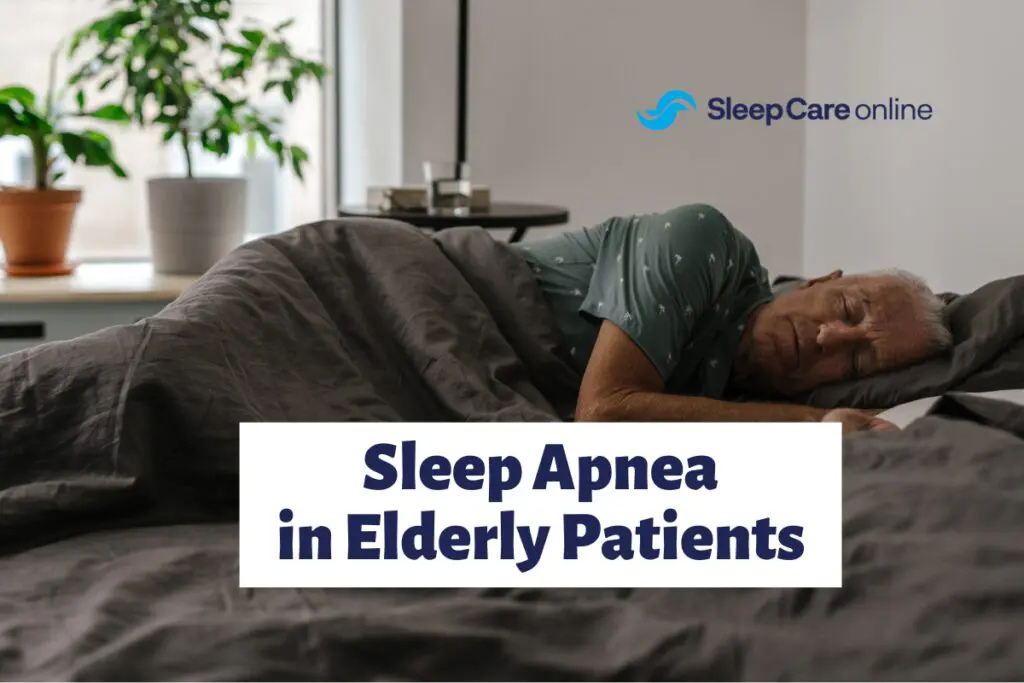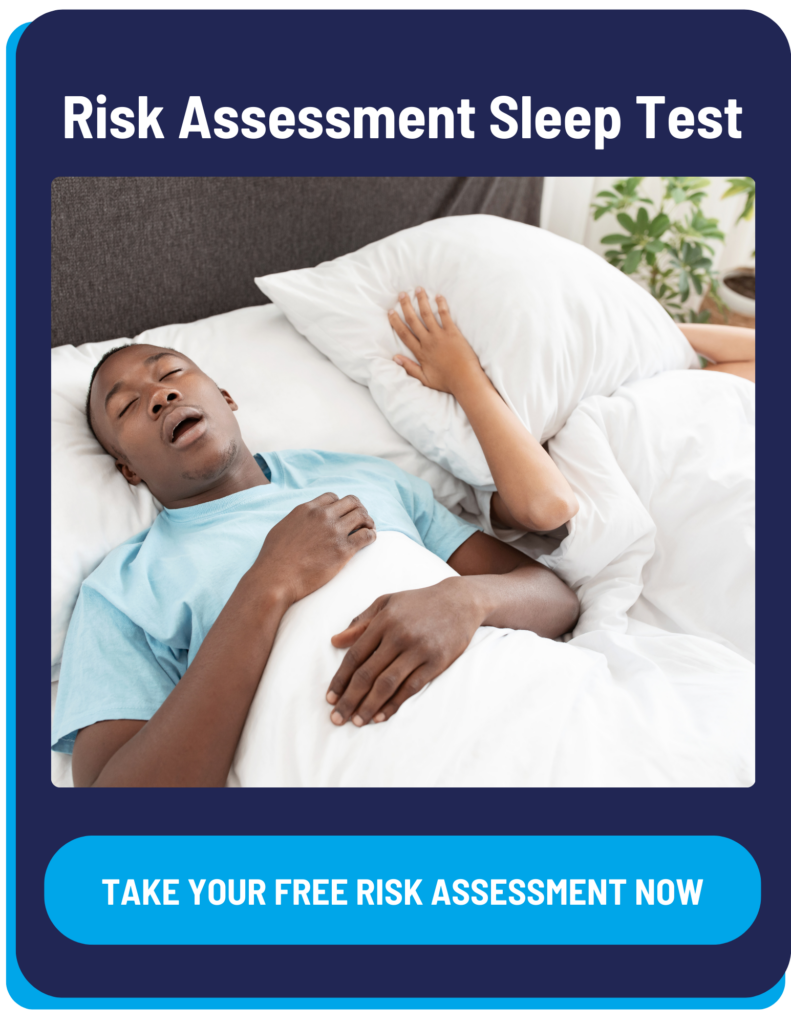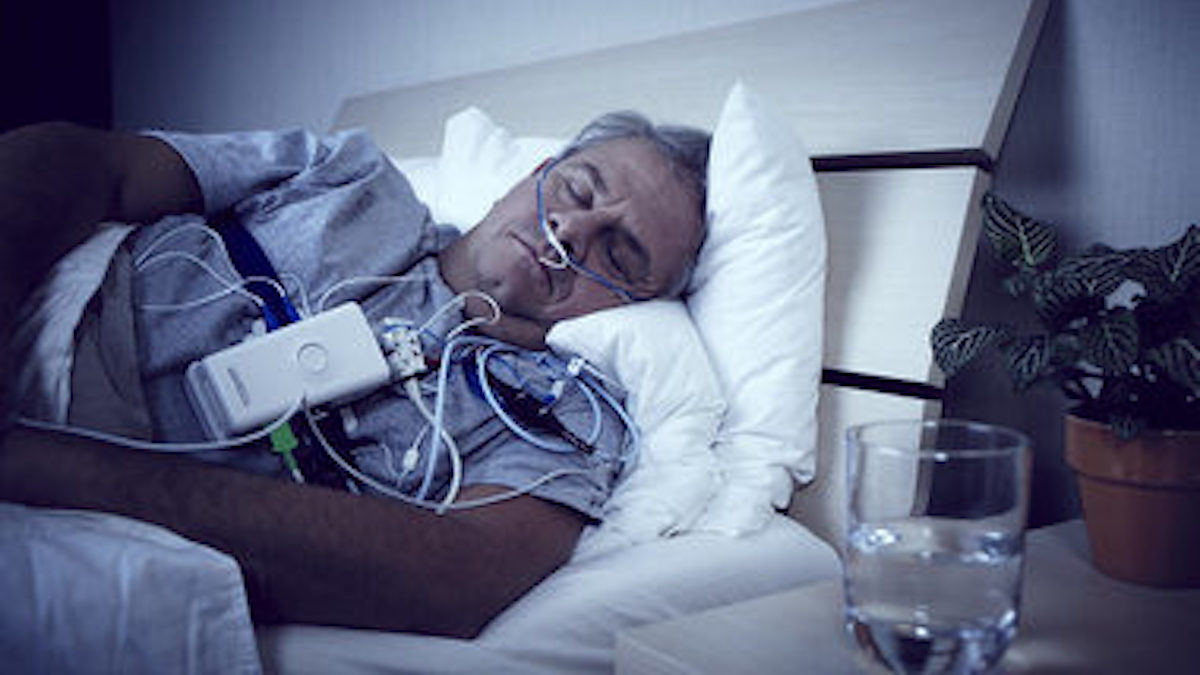Key Takeaways:
- CPAP therapy on a nightly basis helps keep the airway open to prevent apneas and improve sleep. CPAP compliance is critical to minimizing the symptoms of sleep apnea.
- Elderly people are more at risk for developing sleep apnea, which not only affects their health and well-being over time but also diminishes cognitive ability among aging adults.
- Getting tested for sleep apnea is the best solution for anyone who suspects that they are experiencing a sleeping disorder, especially for the elderly. Learn more in this article.

While sleep apnea can occur in any age group, evidence shows that with increasing age comes an increased likelihood of sleep apnea. If an individual already has sleep apnea, the severity may also increase with age. Often many of the symptoms associated with dementia in older people may be related to sleep deprivation due to sleep apnea. The elderly are continually at risk for developing this sleep disorder, which not only impairs physical health over time but also diminishes cognitive ability among aging adults.
Also, because aging and sleep apnea often go hand in hand, it is not uncommon for dementia to be misdiagnosed for symptoms that might be sleep-related. Drowsiness during the day and the impairment of cognitive functions may be misidentified as early-onset dementia.
Sleep apnea may also accelerate the aging process. Consistent sleep deprivation begins to degrade the body the same way that aging does.
What is Obstructive Sleep Apnea?
Sleep apnea most commonly occurs when the muscles in the throat collapse during sleep. This blocks the airway and prevents oxygen from traveling throughout the body, causing the individual to gasp for air and wake up. These events, or apneas, can occur as frequently as 30 times per hour, disrupting sleep and leaving patients with lingering side effects. Additionally, long-term sleep apnea leaves most patients sleep-deprived, which causes lasting health issues.
Is Sleep Apnea More Common in the Elderly?
Daytime sleepiness and sleep apnea are common problems in older people, with sleep apnea affecting up to 20 percent of older adults. That’s because as the body grows older, muscles tend to weaken, including the ones in your airways. Many older adults also may see sleep loss as typical of aging and do not directly address the problem.
What Are the Symptoms of Sleep Apnea in the Elderly?

Sleep apnea symptoms among the elderly are similar to symptoms among sleep apnea patients of all ages.
- Drowsy during the day
- Waking up gasping for air at night
- Frequent morning headaches
- Dry mouth in the morning
- Reduced concentration, memory, and attention
- Mood swings, depression, or anxiety
Many senior patients may be overlooked as having sleep apnea by doctors mostly because old age brings about similar problems. Doctors may prescribe sleep medications rather than consider CPAP therapy for many seniors.
Causes of Sleep Apnea in Elderly
Sleep Apnea and Aging – How Are They Related?
Older adults with obstructive sleep apnea will develop excessive daytime sleepiness and can grow dependent on frequent daytime naps. Along with impaired attention, memory, response time, and performance, this population is also at an increased risk of falls because of mental impairment from sleep loss.
On the cellular level, sleep loss begins to have an impact. The science of epigenetics studies the changes that can happen in our DNA because of lifestyle and environmental factors. These changes can affect how genes behave but do not change the sequence of the genes themselves, So, existing genes for conditions like dementia exist at the cellular level, but sleep deprivation may be accelerating the path to the early development of the condition.
Researchers have found that regardless of factors like body mass index, geographic location, socio-demographics, or health behaviors, worse sleep-disordered breathing severity was associated with faster epigenetic age acceleration.
Changes in Your Body During Sleep Apnea
Chronic sleep apnea begins to have an impact on overall health that can become long-term issues.
Adult asthma: sleep apnea can worsen asthma symptoms and increase your risk of asthma complications.
High blood pressure: sleep apnea increases your risk for high blood pressure.
Heart problems: sleep apnea has been linked to heart failure, stroke, and irregular heart rhythm.
Weakened immune system: sleep loss from sleep apnea can weaken the immune system and leave you vulnerable to more infections.
Liver problems: sleep apnea has been associated with fatty liver disease and higher-than-average liver enzymes.
High blood sugar: People with sleep apnea are more likely to develop Type 2 diabetes. If you already have Type 2 diabetes, sleep loss from sleep apnea can make it worse.
Low blood oxygen levels: sleep apnea over time can deprive your body of essential oxygen, which can impact the health of body tissue and organ tissue.
Mental health issues: Sleep apnea can lead to depression, mental confusion, poor concentration, and memory loss.
Is Sleep Apnea in the Elderly Deadly?
Sleep apnea does increase the risk of death in the elderly. The impact of sleep apnea on health, in general, elevates already existing health problems in the elderly. High blood pressure, heart disease, and diabetes in elderly patients can become magnified by sleep deprivation which increases the risk of mortality.
Complications of OSA in the Elderly
Dementia
Obstructive sleep apnea begins to impact cognitive function over time such as memory and attention. Seniors with an existing issue such as dementia may experience the disability more profoundly because of sleep loss from sleep apnea. Seniors with sleep apnea may begin to show signs of dementia as sleep apnea goes undiagnosed. Learn more about the link between dementia and sleep apnea.
Parkinson’s Disease
While the results are inconclusive, there is strong evidence that sleep apnea may lead to Parkinson’s disease. Moreover, sleep apnea reduces oxygenation to the brain, which over time can stimulate a specific protein alpha-synuclein in the blood. This elevated protein level becomes toxic and begins the degenerative process. Learn more about Parkinson’s and sleep apnea.
Alzheimer’s Disease
Most Alzheimer’s patients experience some type of sleep disorder. Because brain health is so dependent on good sleep, sleep lost through obstructive sleep apnea can be debilitating for seniors suffering with this condition. If a senior has been diagnosed with Alzheimer’s disease, sleep apnea can amplify the symptoms and increase the degenerative aspects of the disease.
Breathing Disordered During Sleep Speeds Up the Aging Process
Breathing-disordered sleep essentially means that your breathing is interrupted while you sleep. Sleep apnea prevents deep sleep and the natural sleep cycle from occurring with periodic episodes in which the airway closes, causing sleep to be interrupted. When left untreated, breathing-disordered sleep starts to deprive the body of essential oxygen, and health issues ensue. The biological aging process becomes more rapid, and our bodies begin to degrade much sooner than they should.
Because sleep apnea is often left untreated, the aging process speeds up our physical and mental decline. Research has already linked sleep apnea to the rapid aging process.
Risk Factors for Sleep Apnea in the Elderly
There are many risk factors for sleep apnea in elderly patients. They include:
Age: As mentioned, the risk of developing sleep apnea increases as you get older, primarily in your 60s-70s.
Sex: Men are generally more likely to develop sleep apnea. Their risk of sleep apnea increases the further they get into adulthood.
Head and neck anatomy: Obstructive sleep apnea occurs more frequently in people who have specific anatomical features including a larger tongue and a shorter lower jaw.
Weight: Those who have a higher body mass index (BMI) have an increased risk of developing obstructive sleep apnea.
Nasal congestion: If you have difficulty breathing through your nose, you are at more risk of developing sleep apnea.
How to Diagnose Obstructive Sleep Apnea in The Elderly?
Polysomnography
Polysomnography is an in-lab sleep study that can diagnose obstructive sleep apnea and determine its severity. The test requires an overnight stay in a lab where equipment that monitors sleep patterns is affixed to the patient.
In-lab studies can evaluate breathing patterns, brain waves, and oxygen saturation levels during the overnight stay.
At-Home Sleep Test
Fortunately, at-home sleep tests can provide accurate results in the comfort of a senior’s own bed. They are the preferred option over a polysomnography for seniors who do not want to participate in a lab study. Here is how a home sleep test works:
- With the Complete Care Package, schedule a 10-minute telehealth visit with a healthcare provider to discuss your symptoms, upcoming sleep study, test results, and treatment options.
- A multi-night, disposable home sleep apnea test is mailed to your home to be completed at your convenience.
- A physician analyzes the sleep data and provides a prescription if needed.
- Schedule an optional follow-up appointment (additional fee applies).
- We connect you to sleep experts who can offer customized sleep therapy options, assistance in equipment purchase, and initial set-up.
How Can CPAP Act as a Preventive Measure in Reversing the Aging Process?
CPAP or continuous positive air pressure helps keep the airway open during sleep as a treatment for OSA. CPAP therapy is the most common treatment for obstructive sleep apnea. It is non-invasive and used by millions of sleep apnea patients.
CPAP therapy uses a CPAP machine, prescribed by a doctor, to flow pressurized air through a hose and into a mask worn by the patient as they sleep. While the patient sleeps, the pressurized air keeps the airway open and prevents the episodic gasping for breath that occurs when the airway closes. Sleep stops being interrupted by the apneas. While CPAP therapy takes getting used to, most patients will find the results positive. Staying CPAP compliant simply means sticking to a consistent prescribed CPAP therapy routine while sleeping.
With CPAP, patients can begin to achieve the healthy sleep they need. Over time, healthy sleep raises blood oxygen levels and slows down tissue degradation. It also helps prevent the mental health issues associated with sleep deprivation.
That means that getting diagnosed with sleep apnea is the best solution for anyone who suspects that they are experiencing a sleeping disorder. With proper diagnosis comes proper treatment. CPAP therapy can help slow the body’s aging process. And, it may also assist in preventing other harmful diseases and conditions associated with sleep deprivation.
References
- American Academy of Sleep Medicine. Risk of Death is High in Older Adults with Sleep Apnea and Daytime Sleepiness, April 2011.




